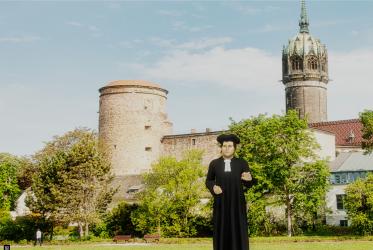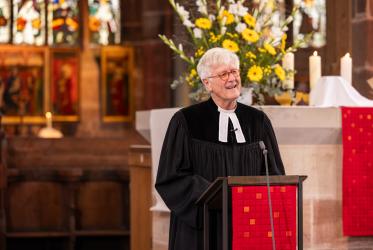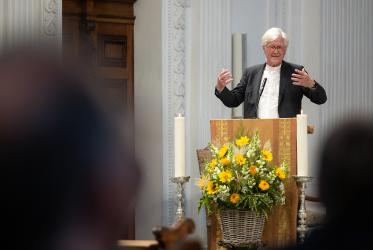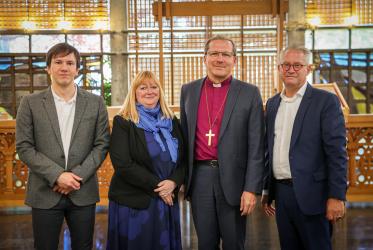In a 25 August speech at the Wittenberg Ecumenical Assembly, World Council of Churches (WCC) general secretary Rev. Dr Olav Fykse Tveit reviewed the work of the ecumenical movement in 2017, describing the present as “an extraordinary ecumenical chance at this point in history.”
He spoke during a week-long event, the 44th conference of the International Ecumenical Fellowship, which ran from 21-28 August.
Tveit reflected that, if we are living in a very dangerous phase of human history, we are also witnessing a moment of renewed hope for life.
The tensions around the Korean Peninsula have brought us even closer to a nuclear stand-off during the last weeks,” he said. “In addition, the denial of global warming and its consequences and the violence and war in the Middle East and other regions are other factors darkening the horizon of the future of humankind.”
In contrast to this bleak picture, however, more and more people are realizing they cannot remain silent bystanders but must act.
“Was this not the case for so many who were moved and motivated by Martin Luther, Ulrich Zwingli or John Calvin at the time of the Reformation?” Tveit asked. “Of course, we learned that this momentum can get lost, can even be turned upside down as a legitimization of human power and a justification for violence and war.”
Tveit also described the signs of hope he has seen in his travels. “I just visited the people and churches in the Pacific who still suffer the consequences of nuclear testing in their region and see their islands threatened by the consequences of climate change,” he said. “But they continue to celebrate life and to look out for the solidarity of their sisters and brothers worldwide that is so important for them.”
He also described the hope he felt when the WCC leadership met with Pope Francis for a private audience.
“There is only one common future and hope for all or there is no hope for the future at all,” he continued. “We have seen in the ecumenical movement how repentance and mutual accountability have contributed to the deepening of the fellowship and the capacity to address the dividing powers of this world.”
Rather than focusing on our enemies, we should pay attention to the forces that make people enemies to one another, he said. “We have to analyze how the polarizing and dividing powers that lead to conflict and war today are working against the will of God in this world.”
The churches are in many ways affected by the divisions of our times, Tveit continued. “In theological terms the lack of the capacity to relate to the other or the neighbour in responsible ways reflects the brokenness of community with the other and with God,” he said. “The continuing existence of injustice, racism, war, killings, persecution and despair driving people to flee from their dear homes and families reminds us that these are not just matters of history but remain a reality for Europe and the world today.”
A “test case” for solidarity today is related to peace and unity in the Korean peninsula, Tveit said. “My deep conviction is that the churches – and civil society – have a huge potential in building trustful relations, opening the doors for cooperation and dialogue, and to advocate for peaceful, diplomatic and political solutions to the escalating conflict,” he said. “The new president of South Korea affirmed this strongly in the meeting we had with him recently in Seoul.”
This year we also remember the war in June 1967 that led to 50 years of occupation of the land of the Palestinians, Tveit reflected. “We have as the WCC been constantly working for justice and peace in Israel and Palestine,” he said. “We continue to do so with different initiatives. There is no way to defend this occupation, which has developed more and more into colonization of an area outside the internationally recognized borders of Israel.”
Tveit urged people to see the value of moving forward together as churches in a pilgrimage of justice and peace. “We do have an extraordinary ecumenical chance at this point in history. Let us pray that we don’t miss it.”
Full speech, by Rev. Dr Olav Fykse Tveit (English, German, French and Spanish)






